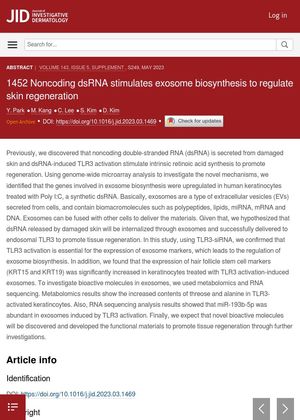Noncoding dsRNA Stimulates Exosome Biosynthesis to Regulate Skin Regeneration

TLDR Noncoding dsRNA helps produce exosomes that aid in skin regeneration.
The study explores the role of noncoding double-stranded RNA (dsRNA) in skin regeneration, particularly focusing on its impact on exosome biosynthesis. Researchers found that dsRNA-induced TLR3 activation in human keratinocytes upregulates genes involved in exosome production. These exosomes, which carry various biomolecules, can deliver dsRNA to endosomal TLR3, promoting tissue regeneration. The study confirmed that TLR3 activation is crucial for exosome marker expression and observed increased hair follicle stem cell markers (KRT15 and KRT19) in keratinocytes treated with TLR3-activated exosomes. Metabolomics and RNA sequencing revealed higher levels of threose, alanine, and miR-193b-5p in these exosomes. The findings suggest potential for discovering new bioactive molecules to enhance tissue regeneration.



